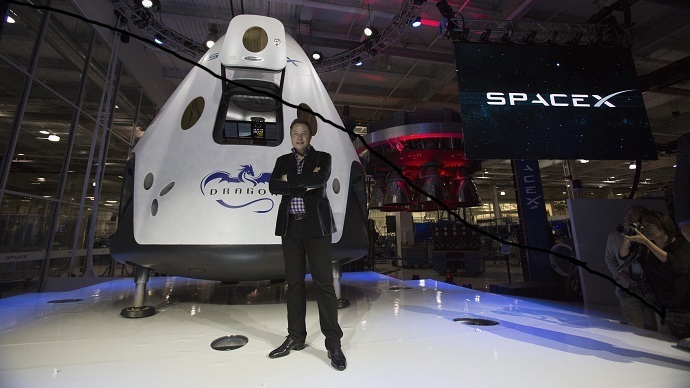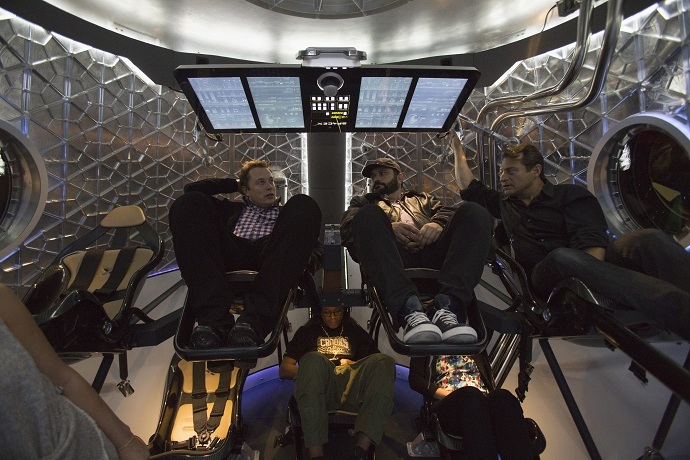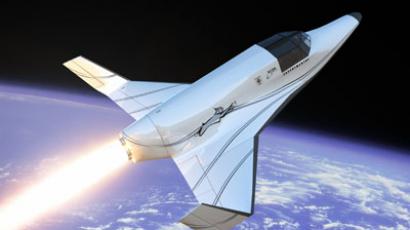‘F**k Earth!’ Elon Musk wants to send million people to Mars to ensure humanity’s survival

SpaceX founder Elon Musk has made no secret of his dreams to colonize Mars. But now he’s opened up about the practicalities and challenges of creating a human outpost on the Red Planet.
“Musk is on an epic run. But he keeps pushing his luck,” Ross Andersen wrote for Aeon Magazine, after sitting down with the billionaire. “In every interview, there is an outlandish new claim, a seeming impossibility, to which he attaches a tangible date. He is always giving you new reasons to doubt him.”
In June, the entrepreneur and inventor said that he wants to take humans to Mars during the next decade. In January 2013, Musk announced he has made plans to build a settlement for 80,000 people on Mars when technology makes it possible for man to live there – as long as the inhabitants are vegetarians.
“Fuck Earth! Who cares about Earth?” he joked.
@elonmusk believes @NASA needs to get people on Mars as soon as possible. https://t.co/3KZWhhmKJGpic.twitter.com/ariWiPW5tO
— [ NASA News ] (@getinsideNASA) September 30, 2014
Now those plans have increased to a million people in order to form a sustainable, genetically diverse civilization, Musk told Andersen.
“Even at a million, you’re really assuming an incredible amount of productivity per person, because you would need to recreate the entire industrial base on Mars,” he said. “You would need to mine and refine all of these different materials, in a much more difficult environment than Earth. There would be no trees growing. There would be no oxygen or nitrogen that are just there. No oil.”
The SpaceX CEO believes the future of mankind depends on our ability to move beyond Earth and into the heavens beyond.
“I think there is a strong humanitarian argument for making life multi-planetary, in order to safeguard the existence of humanity in the event that something catastrophic were to happen, in which case being poor or having a disease would be irrelevant, because humanity would be extinct,” Musk said. “It would be like, ‘Good news, the problems of poverty and disease have been solved, but the bad news is there aren’t any humans left’.”

But colonizing Mars has its own unique problems. First, the cost of creating the settlement and populating it is immense. Right now, even sending unmanned spacecraft to the planet is expensive. Last Wednesday, India became the first nation to reach Mars on its maiden attempt after its Mars Orbiter Mission, a low-cost $74 million project, completed its 10-month journey and successfully entered the Red Planet’s orbit.
SpaceX spent more than 40 times that amount on its own Mars adventure.“The last RC car we sent to Mars cost more than $3 billion. That’s a hell of a droid,” Musk said. “For that kind of money, we should be able to send a lot of people to Mars.”
India reaches Mars at ~1/10th the cost of NASA. @elonmusk's SpaceX may have some future competition? #IndiaAtMars | pic.twitter.com/Cd3ySsYY41
— Tristan Hensel (@henseltristan) September 24, 2014
The man whose companies include Tesla Motors and PayPal has already worked out the payment scheme for the Mars colony. Those wishing to create a homestead in space will have to pay their own way.
“There needs to be an intersection of the set of people who wish to go, and the set of people who can afford to go,” he said. “And that intersection of sets has to be enough to establish a self-sustaining civilization. My rough guess is that for a half-million dollars, there are enough people that could afford to go and would want to go. But it’s not going to be a vacation jaunt. It’s going to be saving up all your money and selling all your stuff, like when people moved to the early American colonies.”
Just like life for the earliest Americans arriving at Jamestown and Plymouth, New Amsterdam and Providence Plantation, life will be difficult, the terrain foreign and the obstacles unknown.
“Never again would you feel the sun and wind on your skin, unmediated. Indeed, you would probably be living underground at first, in a windowless cave, only this time there would be no wild horses to sketch on the ceiling,” Andersen wrote. “Cabin fever might set in quickly on Mars, and it might be contagious. Quarters would be tight. Governments would be fragile. Reinforcements would be seven months away. Colonies might descend into civil war, anarchy or even cannibalism, given the potential for scarcity.”
Replenishment of supplies, just like in colonial times, will be far from instantaneous, requiring months of advance planning and massive amounts of money.
“Excluding organic growth, if you could take 100 people at a time, you would need 10,000 trips to get to a million people,” Musk said. “But you would also need a lot of cargo to support those people. In fact, your cargo to person ratio is going to be quite high. It would probably be 10 cargo trips for every human trip, so more like 100,000 trips. And we’re talking 100,000 trips of a giant spaceship.”
Musk is already working on plans for a reusable rocket, one that can descend smoothly back to Earth after launch, and be ready to lift off again in an hour, he told Andersen.
For him, the colonization of Mars is the only way to prevent the cataclysmic collapse of humanity.
“I think we have a duty to maintain the light of consciousness, to make sure it continues into the future,” he said.














